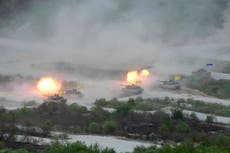Failed North Korea satellite launch sparks evacuations and panic in South Korea and Japan
Pyongyang likely to launch second round of satellite before 11 June
North Korea's attempt to put the country's first spy satellite into orbit failed on Wednesday in an embarrassment for Kim Jong-un, amid his push to boost military capabilities.
The rocket carrying the "Chollima-1" satellite crashed into waters off the Korean Peninsula's western coast after losing thrust following the separation of its first and second stages.
The rocket was launched at 6.30am (local time) northwestern Tongchang-ri area, where the Hermit Kingdom's main space launch centre is located, the South Korean military said.
The satellite launch rocket failed because of instability in the engine and fuel system, according to Pyongyang's KCNA news agency.
However, the launch prompted emergency alerts and brief evacuation warnings in parts of South Korea and Japan.
Alerts were issued through public speakers and text messages in South Korea's capital Seoul City, asking residents to prepare for an evacuation. Alerts were later lifted as there were no reports of damage or major disruption.
Similarly in Japan, the Fumio Kishida government activated a missile warning system for its Okinawa prefecture in the southwestern part of the country, believed to be in the path of the rocket.
"Please evacuate into buildings or underground," the alert said. It was later lifted as well.
The South's joint chiefs of staff said the military was conducting a salvage operation to recover what is believed to be parts of the space launch vehicle.
Following the launch, officials from the US, Japan, and South Korea held a phone call, where they “strongly condemned" the launch. The three countries will stay vigilant with high sense of urgency, the statement said.
The North is likely to stage a second round of satellite launch before 11 June, Yonhap reported, citing the South's presidential office.
US president Joe Biden and his national security team were assessing the situation, National Security Council spokesperson Adam Hodge said.
Pyongyang had warned that it would launch its first military reconnaissance satellite between 31 May and 11 June in an effort to boost monitoring of US military activities.
Ri Pyong Chol, the vice-chair of the Central Military Commission of North Korea's ruling Workers' Party, said on Tuesday that the ongoing joint military exercises by the US and South Korea required Pyongyang to have the "means capable of gathering information about the military acts”.
He said the surveillance assets are tasked with “tracking, monitoring, discriminating, controlling” and responding – both in advance and real time.
Hirokazu Matsuno, the chief cabinet secretary of Japan, said North's rocket disappeared from the radar above the Yellow Sea and did not make it into space.
"We strongly condemn North Korea's actions," he said, adding that Tokyo lodged a complaint to Pyongyang through diplomatic channels in Beijing.
The US State Department previously said that any North Korean launch that used ballistic missile technology would violate multiple UN Security Council resolutions.
"Space launch vehicles (SLVs) incorporate technologies that are identical to, and interchangeable with, those used in ballistic missiles, including intercontinental ballistic missiles," a State Department spokesperson said.
Pyongyang's National Aerospace Development Administration (NADA) will investigate the "serious defects" and take action to overcome them before conducting a second launch as soon as possible, according to KCNA.
The satellite is one of several high-tech weapons systems that the North’s supreme leader publicly vowed to introduce in recent years. Other weapons he has pledged to develop include a multi-warhead missile, a nuclear submarine, a solid-propellant intercontinental ballistic missile and a hypersonic missile.
Join our commenting forum
Join thought-provoking conversations, follow other Independent readers and see their replies
Comments


Bookmark popover
Removed from bookmarks